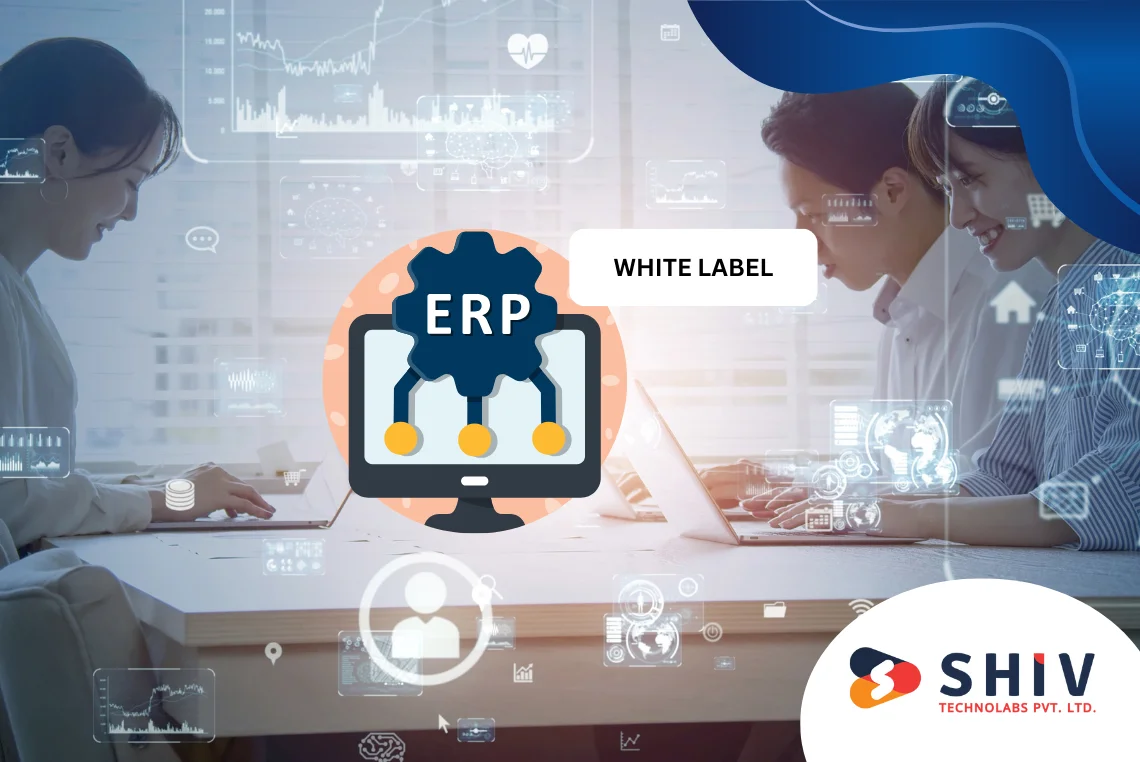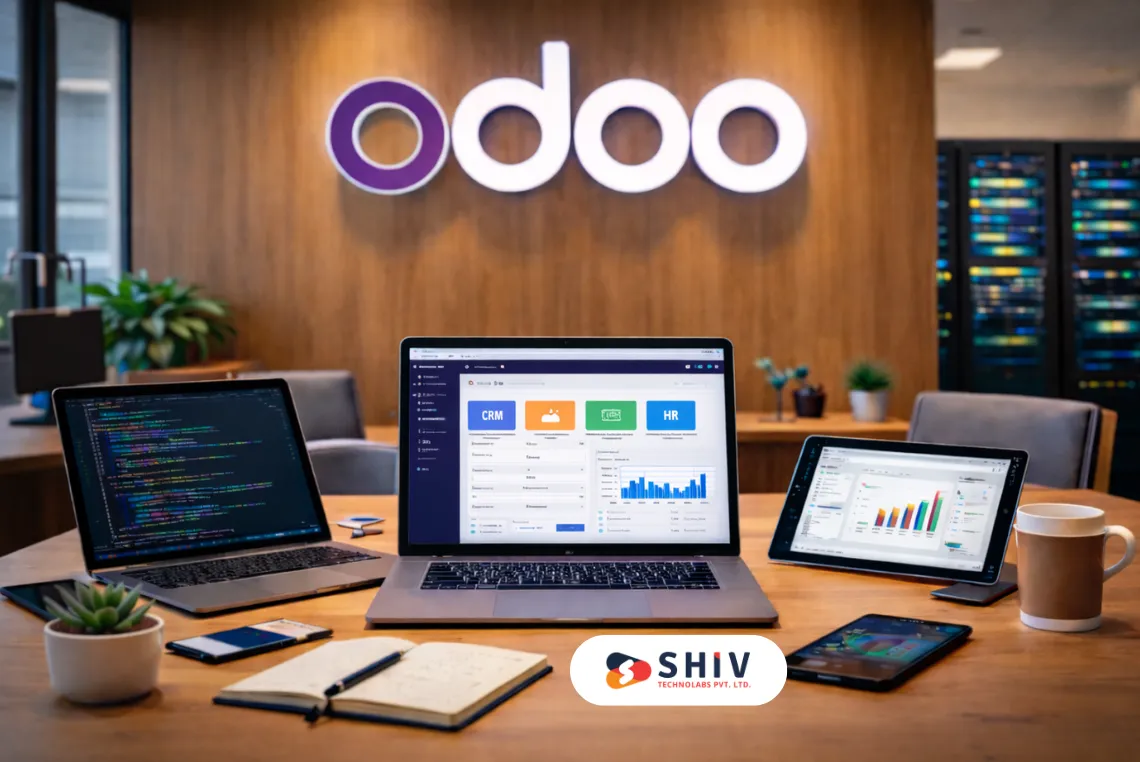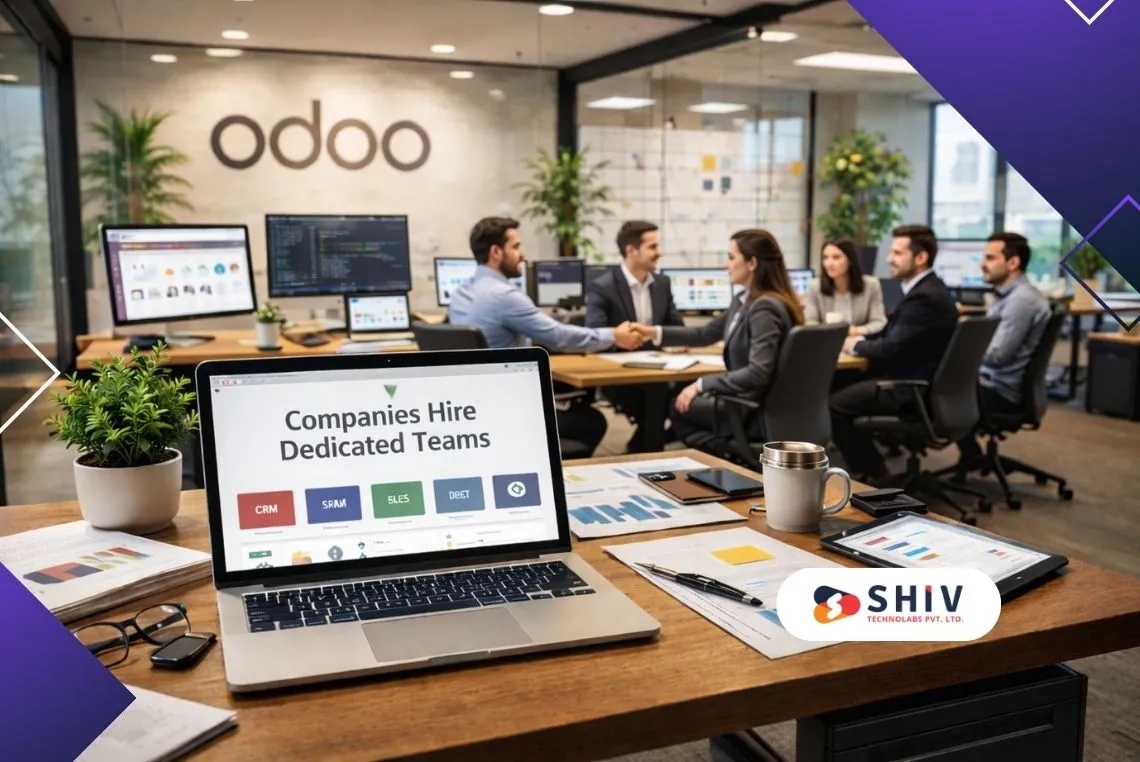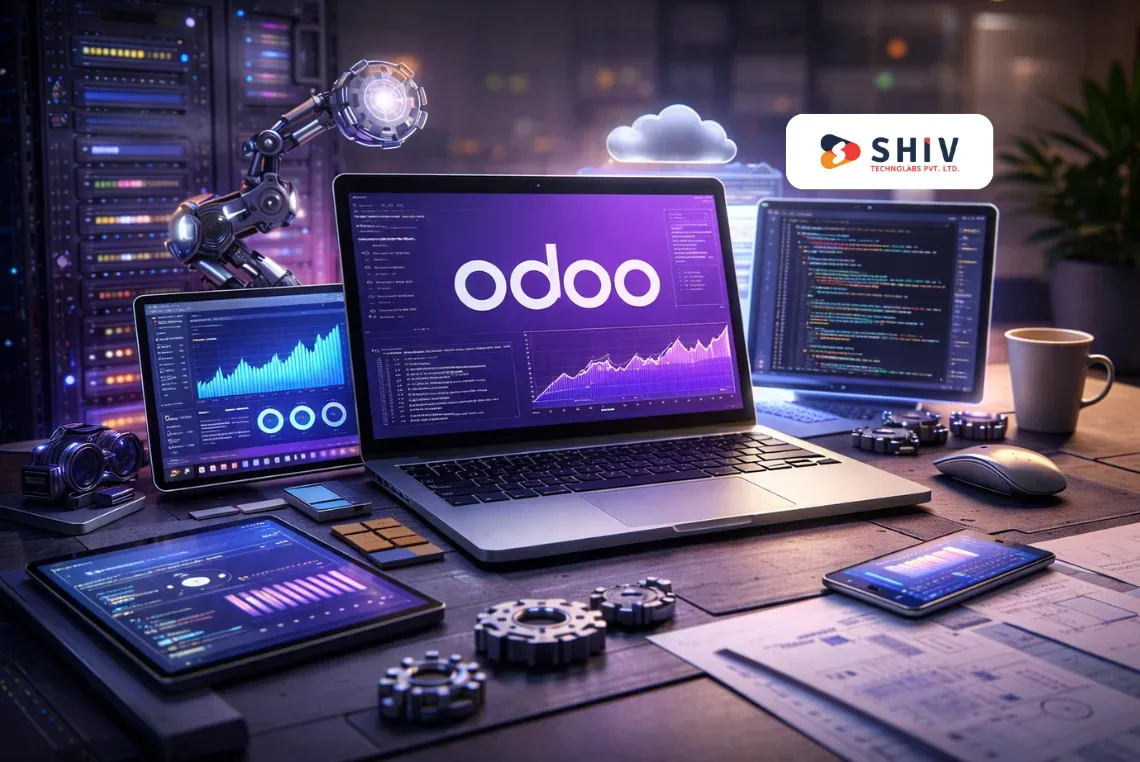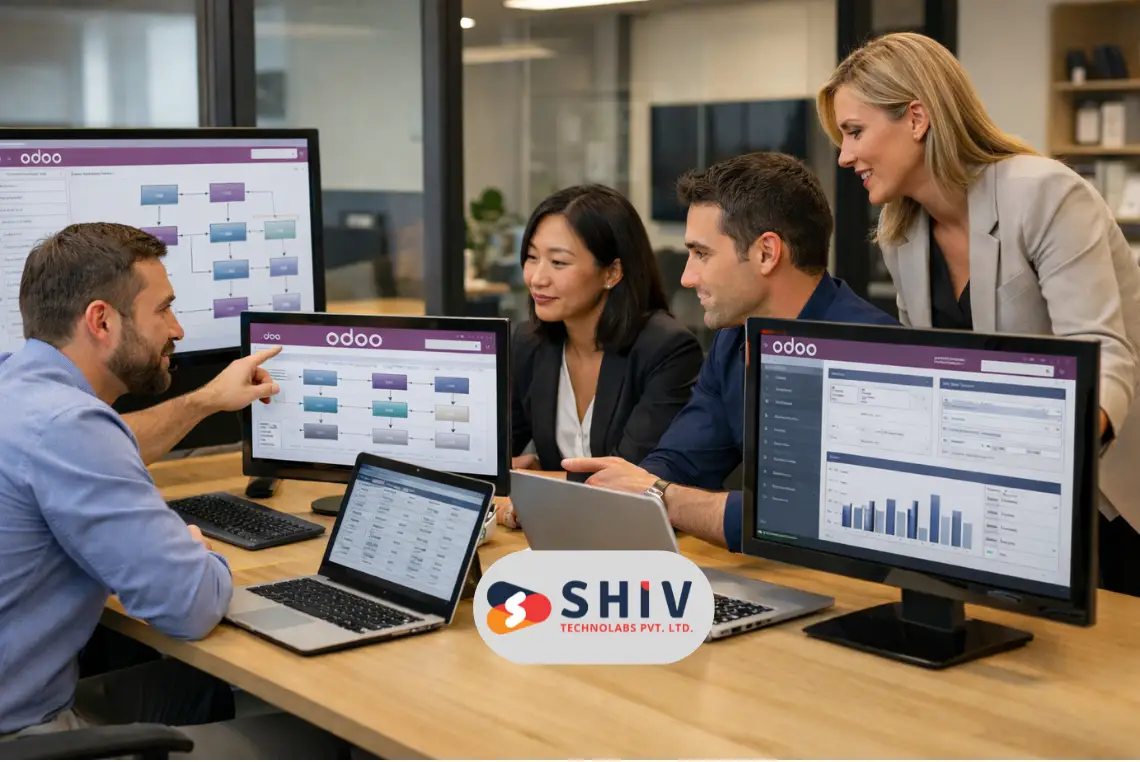Table of Contents
Agencies win more deals when they deliver ERP under trusted partners with white label development services. This model lets you offer a robust ERP without hiring or training a large internal team. You keep your brand front and center while seasoned experts handle the build, rollout, and support.
Agencies, SaaS companies, and IT firms choose ERP outsourcing services to reduce risk and speed delivery. They avoid fixed payroll, tap cross-domain skill sets, and meet client roadmaps with predictable pricing. In this guide, you will learn costs, benefits, best practices, platforms, and industry use cases.
We also outline pricing models, from hourly rates to fixed bids, so you can plan margins. By the end, you will know when to use partners, what to ask, and how to scale. Let’s begin with a clear look at the model and the core modules it covers.
We keep language simple and focus on the steps your team can act on this quarter. Use this playbook to pitch with confidence and deliver results your clients can measure fast.
What Is White Label ERP Development and How Does It Work?
White label ERP development means a partner builds the ERP, and you sell it under your brand. You own the client relationship, pricing, and roadmap, while the partner handles engineering and support. The approach gives agencies speed, quality control, and clear margins without building a full in-house team.
Here is how a typical engagement works today, from first call to launch and handover. You collect requirements, brand the proposal, and set the scope; the partner creates the solution blueprint. Together, you validate user roles, approvals, and reports, then plan sprints, UAT, go-live, and training.
Core ERP functions include:
- Accounting and finance
- Customer relationship management
- Human resources
- Supply chain and inventory
- Reporting and analytics
Your partner can start with a platform like Odoo or Dynamics and add custom modules as needed. You control branding, packaging, and support tiers, while the partner maintains code quality and uptime. This lets you sell proven ERP outcomes without carrying the full hiring and training load.
Most partners sign NDAs, follow your delivery playbook, and join client calls as part of your team. You keep all client-facing assets, such as proposals, demos, and onboarding guides, in your brand style. This model creates trust while giving you room to add value through strategy and support plans.
With this setup, you close bigger ERP deals without stretching capacity or missing delivery promises. Next, we cover why agencies pick outsourcing and how it supports growth across busy seasons.
Why Should Agencies Consider ERP Outsourcing Services?
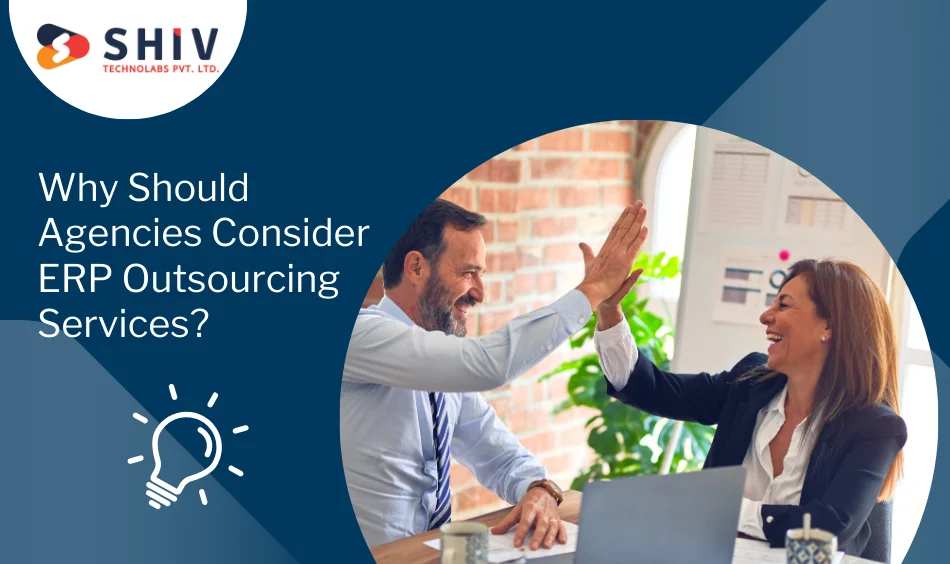
Agencies choose ERP outsourcing services when project load grows faster than hiring pipelines and client timelines stay tight. A proven partner adds capacity on demand while your team leads the relationship, strategy, and upsell conversations. You keep brand control and margins, and your clients get steady delivery across analysis, build, and support.
Outsourcing reduces fixed payroll risk while giving access to niche ERP skills across finance, CRM, HR, and supply chains. You can bid confidently on larger programs, knowing a senior bench is ready for scoping and delivery. This helps sales teams pitch broader roadmaps without worrying about sudden hiring or training delays.
Advantages for agencies:
- Lower fixed costs and better cash flow planning
- Faster kickoff with ready project playbooks and talent
- Access to rare skills for Odoo, Dynamics, Salesforce, and Zoho
- Wider coverage for time zones and support windows
- Predictable pricing with clear milestones and deliverables
- Strong QA, documentation, and release management discipline
- Flexible staffing across business analysts, architects, and testers
- Reusable component libraries that shorten build cycles
- Risk sharing through SLAs and outcome commitments
- Easier post-go-live care with tiered support plans
How outsourcing supports scalability for agencies
Scalability comes from the ability to add skilled people exactly when a deal closes, not months later. Your core team handles discovery, stakeholder alignment, and executive reporting, while the partner executes sprints and release tasks. This split keeps leadership focused on growth, cross-sell, and long-term account value.
Seasonal spikes no longer stall delivery because capacity flexes with your pipeline. When a new project lands, the partner can stage architects first, then bring analysts, engineers, and QA in waves. As the project matures, the team size tapers to a small support pod without hurting service quality.
Outsourcing also improves forecast accuracy and deal velocity. Sales leaders quote realistic timelines, PMs plan with dependable burn rates, and finance teams model margins with fewer surprises. With this model, agencies protect reputation, win bigger programs, and keep clients satisfied through consistent delivery momentum.
How Much Does ERP Development Cost for Agencies?
Most buyers ask about ERP outsourcing costs during the first call and proposal review stage. They also ask how much ERP development costs for agencies across platforms and delivery models. The answer depends on scope, team mix, licensing, integrations, data work, and post-launch support choices.
Start with a short discovery to map processes, roles, reports, and integrations before you size the backlog. Then list environments, migration steps, test plans, and training tasks to build a clean estimate. This detail improves pricing accuracy and helps sales teams present credible timelines and margin targets.
Cost Models
| Aspect | Template/SaaS | Custom Web Development |
|---|---|---|
| Initial Cost | Low ($50-$500/month) | Medium ($10,000-$150,000) |
| Ongoing Cost | High (escalating monthly fees) | Predictable (hosting + maintenance) |
| Scalability | Limited by platform constraints | High (designed for growth) |
| Ownership | No (platform dependency) | Yes (complete asset ownership) |
| Customization | Restricted to templates | Unlimited flexibility |
| Data Control | Limited export options | Complete data ownership |
*Rough market ranges; actuals vary by region, platform, and scope.
Hourly rates rise with complexity and platform depth across Odoo, Microsoft Dynamics, Salesforce, and Zoho. Odoo teams often land between thirty and ninety dollars, depending on module mix and regional billing norms. Dynamics and Salesforce specialists commonly price between sixty and one hundred twenty dollars, with architects slightly higher.
A focused Odoo MVP with two or three modules may land between twenty-five and sixty thousand. Mid-market programs with custom reports, SSO, and six to eight modules often reach eighty to one-hundred-eighty thousand. Enterprise tracks with multi-company finance or deep integrations can extend beyond two hundred fifty thousand.
Key drivers include user counts, data quality, legacy systems, approval flows, and the number of integrations. Common connectors involve payment gateways, WMS, eCommerce, CPQ, BI tools, and external CRM services today. Each link adds mapping, testing, security reviews, and support steps that influence both delivery time and budget.
Protect margins by controlling scope, planning for change requests, and assigning time for UAT and training. Publish a clear support menu with response times, escalation paths, and optional hypercare during launch weeks. Keep a contingency line for data surprises and legacy quirks, so projects finish on time and budget.
What Are the Key Benefits of Outsourcing ERP Development?
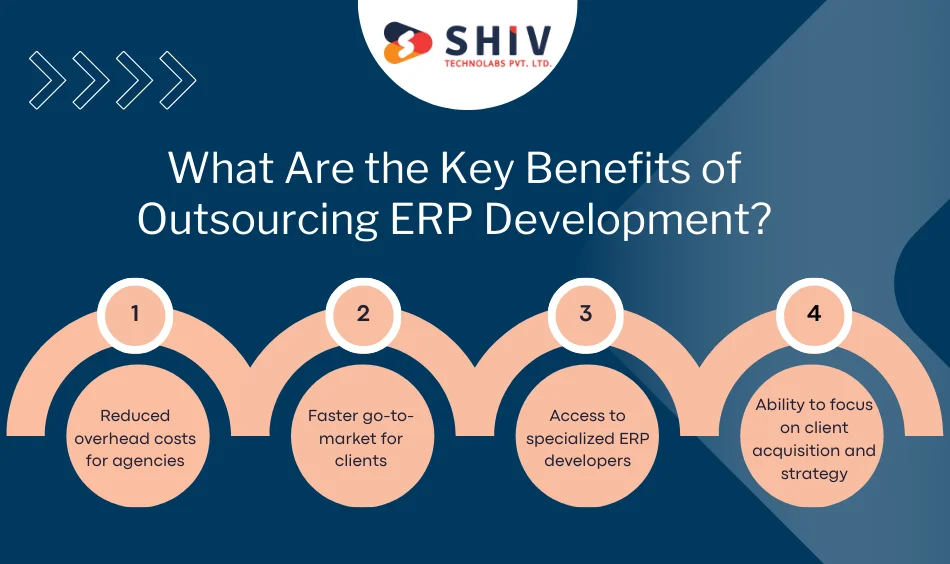
Agencies ask for the benefits of outsourcing ERP development when growth accelerates and timelines get tight. A skilled partner adds capacity, hard-to-find platform expertise, and predictable delivery, while your team guides the client relationship and roadmap with confidence.
Reduced overhead costs for agencies
Outsourcing keeps fixed costs low by avoiding full-time hires, long recruitment cycles, and ongoing tool licenses. You pay for the exact skills and hours a project needs, then scale down after launch. This model protects margins, supports cleaner bids, and frees cash for sales motion, marketing, and success programs.
Faster go-to-market for clients
Partners arrive with playbooks, reusable components, and proven sprint habits across discovery, build, and rollout. They stand up environments quickly, move integrations in parallel, and keep UAT on schedule with clear test plans. Your clients see earlier milestones, faster feedback loops, and a path to value without delivery slowdowns.
Access to specialized ERP developers
Great outcomes often need specialists in Odoo, Microsoft Dynamics, Salesforce, and Zoho, plus data and QA. Outsourcing brings architects for finance, supply chain, and approvals, along with experts in migration and integrations. You gain depth for security reviews, audits, and performance tuning, so complex builds land with confidence.
Ability to focus on client acquisition and strategy
Your core team can center on discovery, stakeholder alignment, and executive reporting instead of day-to-day tickets. Account managers pursue cross-sell opportunities while PMs steer milestones and risk, not staffing fires. This focus raises win rates, boosts satisfaction, and keeps your agency positioned as a trusted growth partner.
Which Industries Gain the Most From ERP Outsourcing?
Agencies pitch ERP when clients need order, traceability, and faster reporting across teams. For SaaS companies, it covers usage tracking, billing cycles, and dunning flows. Marketing agencies see better job costing, faster client approvals, and clearer campaign reports. For startups, it supports lean builds with set budgets and quick releases.
Other strong fits (short notes):
- Manufacturing: BOMs, MRP, quality checks, vendor portals.
- Retail/eCommerce: stock sync, returns, promotions, POS.
- Services: timesheets, milestones, invoicing, margin views.
- Healthcare: appointments, inventory control, audit trails.
What Platforms Are Best for White Label ERP Development?
Agencies offering white label ERP solutions for IT companies usually standardize on one or two platforms. Match the platform to size, budget, and compliance needs, then plan modules and integrations.
Platform snapshot
| Platform | Cost Tier | Ideal Use Case |
|---|---|---|
| Odoo | Low–Mid | Modular builds, fast MVPs, broad app store |
| Microsoft Dynamics | Mid–High | Multi-entity finance, complex approvals, enterprise |
| Salesforce (+ERP add-ons) | High | CRM-first firms, sales ops, partner ecosystems |
| Zoho | Low–Mid | SMBs, quick rollouts, simple admin needs |
Most scale well with the right architecture and cloud choices. Plan data models early to avoid rework later.
What Are the Best Practices for Agencies Outsourcing ERP Projects?
Agencies leading ERP development for agencies need repeatable habits that lower risk. Adopt these ERP outsourcing best practices to keep delivery smooth and clients confident.
- Sign NDAs and MSAs; define IP, support, and SLAs in writing.
- Lock scope, milestones, and acceptance tests before sprints start.
- Run agile sprints with weekly demos and risk logs.
- Enforce data security, access control, backups, and audit trails.
- Stage UAT with real data; plan cutover and hypercare windows.
- Document configs, train users, and publish a support menu.
How White Label ERP Differs From White Label Web Development Services
Agencies sell both, but the stakes differ. Use white label web development services for sites, portals, and UX-first builds; use ERP for cross-department processes.
| Criterion | ERP Outsourcing | Web Outsourcing |
|---|---|---|
| Cost | Mid–High | Low–Mid |
| Complexity | Multi-module, data heavy | Frontend-led, API ties |
| Industries | Ops-driven teams | Brand and marketing teams |
FAQs on White Label ERP Development
What is white label ERP development for agencies?
A partner builds and maintains the ERP while you sell and support it under your brand. You keep control of the client relationship, pricing, and roadmap.
How is it different from reselling a standard ERP license?
Reselling focuses on licenses and basic setup. White label covers full delivery—scoping, builds, integrations, and support—presented as your own service.
Who owns the code and configurations in white label projects?
The SOW defines IP rights. Agencies typically own custom code and configs; the partner retains generic frameworks and internal tools.
Can the partner join client calls and tickets under our brand?
Yes. Agree on roles, email formats, and report templates so the client experiences one unified team.
Conclusion
White label ERP helps agencies win bigger projects while keeping overhead steady and delivery timelines realistic. You keep the client bond and brand control, while partners handle build, integrations, migration, testing, and support. This guide covered pricing models, platform choices, delivery practices, and the use cases where ERP shows clear returns.
Treat discovery, scope control, and data planning as non-negotiable, then stage UAT, training, cutover, and hypercare. Shiv Technolabs provides senior ERP talent across Odoo, Dynamics, Salesforce add-ons, and Zoho, with solid documentation and handover. We help sales quote credible timelines, while PMs track budgets, risks, and post-launch results.
Partner with Shiv Technolabs – your white label development company – for branded delivery, predictable pricing, and steady post-launch care. Share your pipeline, and we will map scope, staffing, and a clear delivery plan. Book a discovery call today, move faster with confidence, and keep clients happy across builds and support.

